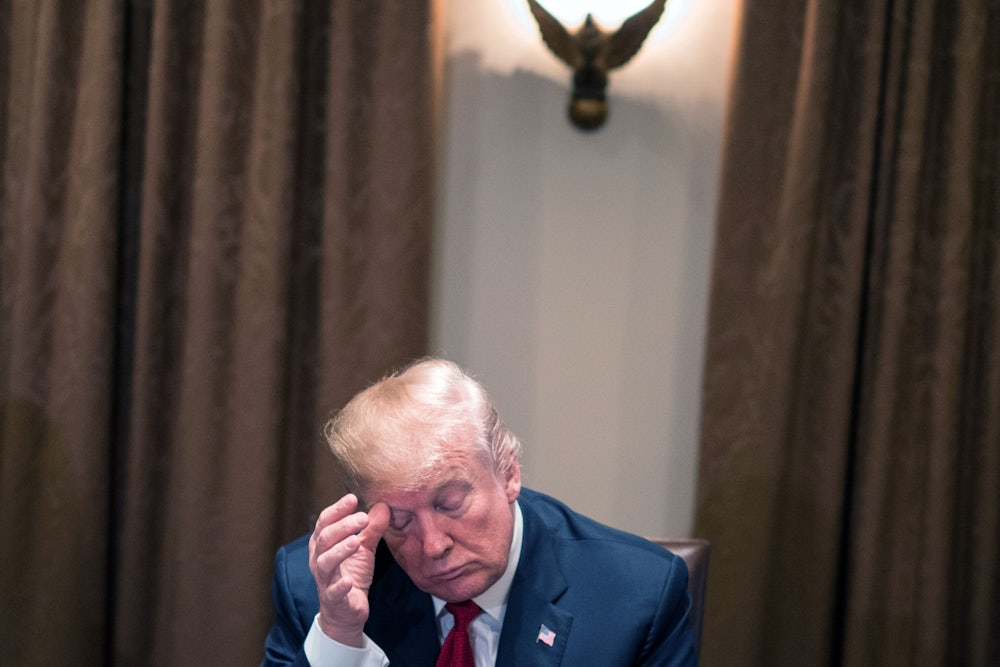The Trump era sometimes feels like a trip through obscure and rarely used mechanisms of federal power, ranging from the emoluments clause to the Twenty-Fifth Amendment. The latest way station in this civic journey is Subsection 11(g) of House Rule X, which outlines the arcane procedure by which Congress can pressure the president to release classified information.
The House Intelligence Committee has now invoked this provision twice in the last two weeks. First, members voted along party lines to release a memo compiled by the committee’s Republican staffers that alleged partisan abuses by federal law-enforcement officials involved in the Russia investigation. House Republicans and conservative media outlets hyped the memo as proof of a political conspiracy against the president, while Democrats and the Justice Department warned that it was highly misleading and potentially damaging to natural security. In the end, the Nunes memo—named for Representative Devin Nunes, the committee chairman—didn’t prove its point or appear to endanger the country’s safety.
The committee’s Republican majority also voted against releasing a ten-page memo drafted by Democratic staffers that purportedly refutes some of the Nunes memo’s claims. But the committee changed course on Monday and unanimously approved the memo’s release, triggering the Subsection 11(g) process for the Democratic memo. Trump now has five days to review its contents and decide whether to approve its release to the public.
This rule dates back to the post-Watergate surveillance reforms of the mid-1970s. At the time, the goal was to balance Congress’ interests in oversight of intelligence agencies with the president’s responsibility to preserve national secrets. Lawfare’s Molly Reynolds noted that Subsection 11(g)’s drafters predicted that the process would be handled judiciously by future American leaders. She quoted Senator Abraham Ribicoff, the Democratic chairman of the Government Operations Committee:
So it is obviously our intention that the President would not act capriciously, but only act if it were a matter of gravity. Of course, none of us could tell the President of the United States what he considers to be a grave matter. I would assume, on the basis of comity, that the President certainly is not going to abuse his discretion. It is my feeling that the President will act responsibly, as I would expect the intelligent oversight committee would act responsibly, in determining whether a matter should be publicly disclosed.
Forty years later, Trump hasn’t lived up to their expectations. For the Nunes memo, the president’s thinking was straightforward: Releasing it carried the short-term political benefit of undermining the credibility of the Justice Department and the FBI, which are currently investigating him and his presidential campaign. Its predicted impact on natural security, which appears to have been inflated by Trump’s critics, and its damage to congressional oversight of intelligence agencies, which is more certain, apparently mattered little in the president’s decision-making process.
But the Democratic memo offers a different calculus of risks and rewards for the president. At the moment, Trump has a few options. The most straightforward choice would be to simply approve the memo’s release in full or with minimal changes and redactions. In doing so, Trump could appear magnanimous and transparent, and more importantly avoid a potentially thorny fight with the House of Representatives over its release and contents. At the same time, the move could be politically risky for him if those contents are damaging to his case against federal law enforcement.
Trump could also approve the memo’s release but with significant redactions. He could claim that these removals are necessary to protect the sources and methods used by intelligence agencies to gather information about foreign threats. That assertion would be received uncritically by Fox News and other Trump-aligned outlets. But Democrats would be quick to allege that the president is trying to cover up the truth for political gain. Trump’s nakedly partisan use of the Nunes memo, which he claimed “totally vindicates” him, would make this almost impossible for the White House to refute.
Representative Devin Nunes, a man of tremendous courage and grit, may someday be recognized as a Great American Hero for what he has exposed and what he has had to endure!
— Donald J. Trump (@realDonaldTrump) February 5, 2018
But the most interesting choice for Trump could be blocking it outright. If he does so, House rules provide a method to override him. The committee chair—in this case, Nunes—can move for the full House of Representatives to go into a closed session to consider whether to release the memo. If, however, he doesn’t make the motion within four calendar days in which the House is in session, then any member of the House can make the motion instead. Under Subsection 11(g), that motion is considered “privileged,” meaning it must be immediately decided “without debate or intervening motion except one that the House adjourn.”
That means House Speaker Paul Ryan and other Republican leaders wouldn’t be able to block the vote from taking place. After a two-hour debate, any member can move to end debate and vote on releasing the memo. That motion is also privileged, limiting Republicans’ ability to block the vote. If a majority of the House votes to accept the committee’s recommendation, the committee can then release the memo. About two dozen Republicans would need to join all Democrats to vote in favor of its release.
It’s entirely possible that Trump could win such a vote. House Republicans have been far more reluctant than their Senate counterparts to criticize the president, let alone defy or actively constrain him. Some of them, like Nunes, are among his most enthusiastic defenders in Congress. But if the Trump and the Republicans block the Democrats’ memo from public view, after having hurried to release the Nunes memo, they will be celebrated only by their core supporters—and viewed with further suspicion by the rest of the electorate.
Correction: A previous version of this article misspelled Senator Abraham Ribicoff’s last name.
